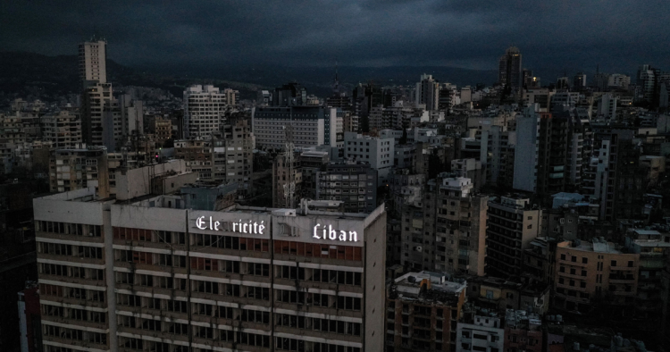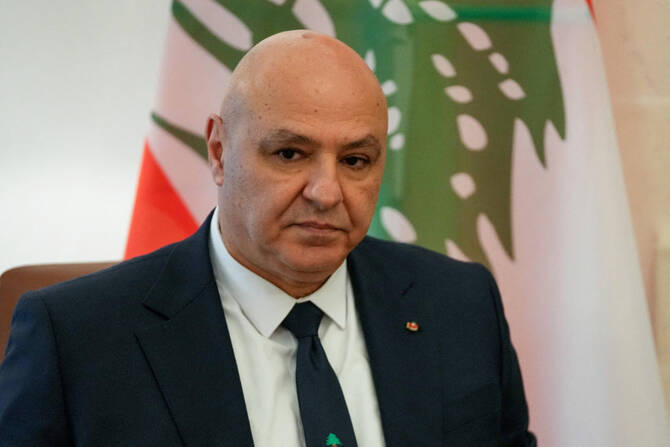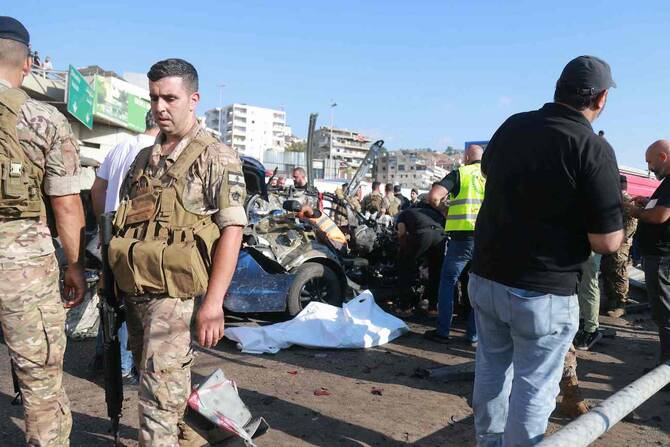Georgi Azar
DUBAI: Lebanon has been plunged into total darkness after its electric grid crumpled, piling further sorrows on a country teetering on the edge of collapse.
In a statement late on Sunday, the state-owned Électricité Du Liban announced that it had entered the stage of a complete blackout after “feeding reached an extremely low level.”
EDL had been supplying around one hour of electricity per day in the crisis-torn country with private generators struggling to fill the gaps, leaving residents with more than 15 hours of blackouts.
Eight feeding stations, which transfer power from Lebanon’s four main power plants onto its grid, have also been seized by angry residents, diverging electricity solely to their towns and villages.
The stations, located in southern Lebanon and Baalbek, have been seized for the better part of a week, with EDL calling on security forces to restore order.
“We’re in no man’s land, it’s simply not safe for employees to go to work anymore,” an EDL manager, who spoke on condition of anonymity, told Arab News.
With these stations effectively being run by untrained residents, the danger of an overload on a circuit becomes a possibility.
“It’s a disaster waiting to happen,” he said. To make matters worse, public-sector employees including EDL workers are expected to go on a full-fledged strike starting this week, he said.
“How do you expect an employee, living on $40 a month, with no gasoline, no medicine and no sense of security, to go to work,” he asked.
Acute fuel shortages have led the small Mediterranean country to the brink of a humanitarian disaster, with hospitals across the country sounding the alarm.
As dwindling diesel stocks threatened the lives of “40 adult patients and 15 children living on respirators” and another 180 others who are receiving dialysis treatment, one of Lebanon’s foremost university hospitals pleaded with concerned stakeholders for help.
These patients would die “within a matter of days,” the American University of Beirut’s Medical Center said on Saturday, before issuing a statement saying that it had replenished its stock for a week.
“After many calls that went unheeded, the AUB administration finally managed to get through to those who saw the dangers and were willing to take the initiative and help. Fuel suppliers, companies and citizens have stepped up, and AUBMC and other hospitals began to receive a resupply of fuel,” it said Sunday.
“AUBMC is gradually building back up its fuel supply and by tonight should have around a week of reserves,” it added.
The impending catastrophe comes on the heels of a tragic accident in the northern Akkar district that killed 28 people and injured scores of others.
At least 28 people were killed and 79 injured when a fuel tanker exploded in northern Lebanon early on Sunday, the health ministry said, after a seized fuel tanker exploded while residents flocked to replenish makeshift tanks.
Accounts varied as to what caused the explosion, from gunfire from the disgruntled tanker owner to reports that it was caused by a person who ignited a lighter.
With the country’s hospitals running on fumes and unable to care for patients amid fuel and medicine shortages, officials turned to friendly neighbors for help.
Three patients with severe burn wounds were airlifted to Turkey while Kuwait and Egypt sent over 10 tonnes of medical aid to Lebanon.
Speaking to his supporters Sunday evening, Hezbollah leader Hassan Nasrallah said his Iran-backed party will begin importing fuel from Tehran.
The militant chief had previously said his group would be able to import fuel from Iran while bypassing Lebanon’s central bank to evade US sanctions.
“We will go to Iran and negotiate with the Iranian government… and buy vessels full of petrol and fuel oil and bring them to Beirut port,” he said, defying the “Lebanese state (to dare) to prevent the fuel and gasoline from reaching the Lebanese people.”






















